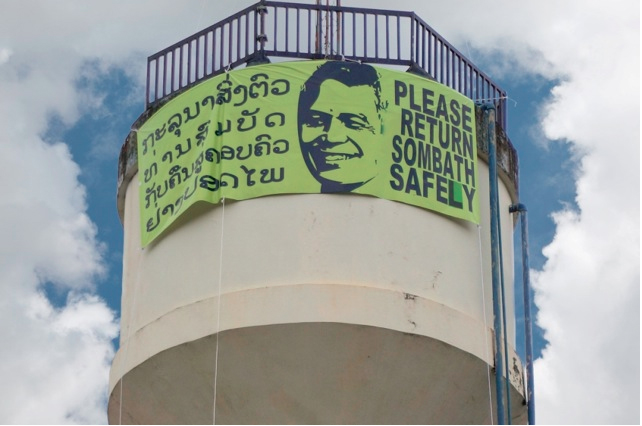RFA: 30 August 2017

Supporters of Sombath Somphone renewed their focus on the missing rural development activist on Wednesday, using the International Day of the Victims of Enforced Disappearances to press Laos to solve the nearly five-year-old mystery of his disappearance.
Video footage show’s Sombath’s Jeep being stopped at a police checkpoint on the evening of Dec. 15, 2012. In the video Sombath is herded into a white truck and taken away, and a man dressed in white returns and drives off in his Jeep.
Soon after he was kidnapped, police promised to investigate, but Lao authorities soon backtracked, saying they could no longer confirm whether the man in the video footage was actually Sombath.
“I have no information. I think there is no progress in the investigation. The police have not contacted me at all even though I have asked to meet them they have not responded to my request to meet,” his wife Shui Meng Ng told RFA’s Lao Service on Wednesday.
“It is already nearly five years that Sombath has gone missing. I urge them to quickly give me a report on what the investigation has found.”
“It is very painful for me to keep waiting, It makes my life very very difficult,” the Singaporean Ng added.
Vanida S. Thephsouvanh, chairwoman of the Paris-based Lao Movement for Human Rights, told RFA that “enforced disapearances happen in countries where government has no political will to address or even acknowledge the issue — countries like Laos, where the government refuses to adequately and effectively investigate cases of enforced disappearances and hold those responsible to for such crimes.”
Sombath’s decades of work on behalf of farmers and sustainable agricultural practices helped him win the U.N.’s Human Resource Development Award for empowering the rural poor in Laos and the prestigious Ramon Magsaysay Award for Community Leadership.
He pioneered the use of participatory rural appraisal (PRA) techniques in Laos. PRA aims to incorporate the knowledge and opinions of rural people in the planning and management of development projects. It is a methodology that requires policy-makers to learn about rural life and the environment from the people who live in project areas.
Just before his abduction Sombath challenged the massive land deals the government negotiated that left thousands of rural Laos homeless with little compensation. The deals sparked rare popular protests in Laos, where political speech is tightly controlled.
Kingsley Abbott, a senior international legal adviser at the International Commission of Jurists, told RFA that the Lao government “should reassess its position of a lack of transparency around this investigation.”
“It’s now past time for them to even hold some kind of press conference, in which the investigators come forward and give a detailed account of where the investigation is at, to the family and to the public, both in terms of what they have succeeded in uncovering and also where the challenges and difficulties lie,” he added.
“We would expect more from the Laotian government in terms of the opportunity it has to independently, impartially, and effectively investigate it, given information that available. But unfortunately the Lao government has released very little information on its investigation,” said Abbott.
Paris-based Thephsouvanh added that Sombath’s case was similar to other disappearances in Laos, including that of Somphone Khantisouk, the owner of an ecotourism guesthouse and an outspoken critic of Chinese-sponsored agricultural projects that were damaging the environment in the northern province of Luang Namtha. He disappeared after uniformed men abducted him in January 2007.
A similar pattern was visible in the case of nine people—two women, Kingkeo and Somchit, as well as seven men, Soubinh, Souane, Sinpasong, Khamsone, Nou, Somkhit, and Sourigna—who were arbitrarily detained by Lao security forces in November 2009 in various locations across the country. Their supporters say the nine had planned peaceful demonstrations calling for democracy and respect of human rights.
In those cases, Thephsouvanh said, “evidence suggests that the State authorities are involved, but no perpetrators have ever been prosecuted.”
“It is about time that the Lao government ends this practice and ratifies the International Convention for the Protection of All Persons from Enforced Disappearance (ICPPED) that Laos signed in 2008,” she added.
Reported and translated by RFA’s Lao Service. Written in English by Paul Eckert

